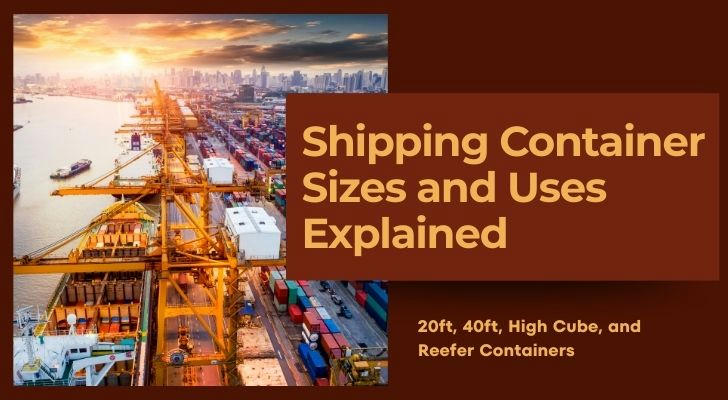🚢 Find the Right Shipping Container for Your Cargo in Just 5 Minutes
🌍 International Moving / 📦 40ft Containers / ❄️ ISO Refrigerated Containers / 🔄 Used Containers for Sale
Choose the wrong shipping container, and your freight expenses could climb by 25%—with the added risk of cargo damage.The solution is simple: follow a few key rules to select the right container—reduce shipping costs, safeguard your cargo, and ship with peace of mind.

📋 Common Types of Shipping Containers (Buyer’s Guide)
| Type | Key Features | Typical Use Case | Best For |
|---|---|---|---|
| 🚛 20ft Standard Container (20ft GP) | Flexible, compact | Small shipments | Personal moves / small business exports |
| 🏗️ 40ft Standard Container (40ft GP) | More space, global standard | Large durable goods | International moves / bulk exports |
| 📏 40ft High Cube (40ft HC) | 1ft taller than GP | Light but bulky cargo | Cotton, plastics |
| 🪵 Open Top Container | Top opens for loading | Oversized or irregular cargo | Trees, tall machinery |
| ⚙️ Flat Rack Container | Collapsible sides / no walls | Extra-large equipment | Wind turbine blades, heavy machinery |
| ❄️ Refrigerated ISO Container (Reefer) | Built-in temperature control | Cold chain logistics | Fresh produce, seafood, vaccines |
| 🛢️ Tank Container | Leak-proof, liquid transport | Food liquids / chemicals | Edible oils, hazardous liquids |
| 🌱 Reusable Container | Durable, eco-friendly | Sustainable logistics | Manufacturing / supply chain exports |
🔑 3-Step Buyer’s Decision Guide
Choosing the right container doesn’t need to be complicated—just follow these three steps:
① Identify Your Cargo
- General goods → Standard containers (20ft / 40ft)
- Oversized cargo → Open Top
- Liquids & Chemicals → Tank Container
- Cold chain shipments → Reefer (ISO refrigerated)
② Define Your Transport Method
- Domestic shipping → Standard container or short-term rental
- International shipping → 40ft GP / HC (check port restrictions & timelines)
③ Decide Based on Budget & Usage
- One-time shipment → Rental for flexibility and savings
- Long-term demand → New containers (durability) or Used containers (cost-effective)
🏢 Real Buyer Stories (with Numbers)
💬 Maria, Food Export Manager
“Relying on ISO reefer containers for dairy exports. They keep products fresh even on long journeys—reducing spoilage by 12% compared to standard shipping.”
💬 Aisha, Startup Founder
“Buying used containers lowered our logistics costs by 30% and allowed us to scale quickly.”
💬 John, IT Professional (moved to Canada)
“My family move was so much smoother with a 40ft container—I avoided weeks of stress and saved at least 20% on extra shipping fees.”
💬 David, Manufacturing Operations Director
“Switching to reusable containers cut transport costs by 18% and lowered emissions by 12%.”
💬 Lars, Chemical Supply Chain Coordinator
“Our chemical products must travel in tank containers—they guarantee compliance and safety.”
✅ Conclusion
Selecting the right container is all about balancing cargo type, shipping method, and budget cycle:
- 🚛 Standard containers → Best for most general goods
- ❄️ Reefer containers → Essential for food & pharmaceuticals
- 🔄 Reusable containers → Cost-efficient and eco-friendly for long-term business needs
As an information integrator, our role is to help buyers save time, reduce costs, and minimize risks.
Whether you’re managing an international move, factory exports, or a cost-conscious startup, the right container isn’t just a box—
it’s peace of mind and guaranteed savings.
